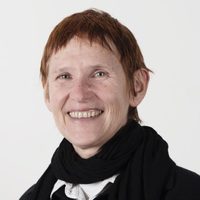 Anitra Nelson
Anitra Nelson Activist-scholar Anitra Nelson discusses options for small and shared living at the eighth South Gippsland Sustainability Festival on Sunday.
WITH homelessness and housing affordability at crisis point in Australia, shared and communal housing could be the way of the future.
Associate Professor Anitra Nelson, an activist-scholar affiliated with RMIT University’s Centre for Urban Research, is at the forefront of research into the alternatives. At the State Coal Mine on Sunday, as part of the Southern Gippsland Sustainability Festival, she’ll lead a discussion of options for small and shared living – from joint households to land-sharing, cohousing and ecovillages.
Her presentation is based on her book Small Is Necessary: Shared Living on a Shared Planet, published in January, in which she argues that moving beyond the usual stand-alone house can result in neighbourhoods and societies that are more outward looking and culturally richer, with lower ecological footprints.
Nelson asks the question “Does small mean less?” The answer, surprisingly, is that small often means more: more amenities, more shared facilities, more opportunities for meaningful personal interaction, and a more equitable and sustainable future.
Her interest in eco-collaborative housing developed out of her experience in the 1990s, when she lived and worked in Commonground, an intentional social change community near Seymour, and Round the Bend Conservation Cooperative in the Bend of Islands, as well as visiting and staying in other eco-collaborative housing in the US and Australia in the 2010s.
She is also an active member of her local Mount Alexander Ecohousing Group, which advocates for eco-collaborative housing, especially for the growing number of senior residents.
Now in its eighth year, the Southern Gippsland Sustainability Festival features displays of alternative energy, local produce, self-sufficiency skills and a range of sustainable products. The event has been growing steadily, with the previous event attracting over 2500 visitors.
Professor Nelson’s presentation is in the meeting room next to the café at noon.
Southern Gippsland Sustainability Festival, Coal Mine Museum, Wonthaggi, from 10am on Sunday, April 8.
Associate Professor Anitra Nelson, an activist-scholar affiliated with RMIT University’s Centre for Urban Research, is at the forefront of research into the alternatives. At the State Coal Mine on Sunday, as part of the Southern Gippsland Sustainability Festival, she’ll lead a discussion of options for small and shared living – from joint households to land-sharing, cohousing and ecovillages.
Her presentation is based on her book Small Is Necessary: Shared Living on a Shared Planet, published in January, in which she argues that moving beyond the usual stand-alone house can result in neighbourhoods and societies that are more outward looking and culturally richer, with lower ecological footprints.
Nelson asks the question “Does small mean less?” The answer, surprisingly, is that small often means more: more amenities, more shared facilities, more opportunities for meaningful personal interaction, and a more equitable and sustainable future.
Her interest in eco-collaborative housing developed out of her experience in the 1990s, when she lived and worked in Commonground, an intentional social change community near Seymour, and Round the Bend Conservation Cooperative in the Bend of Islands, as well as visiting and staying in other eco-collaborative housing in the US and Australia in the 2010s.
She is also an active member of her local Mount Alexander Ecohousing Group, which advocates for eco-collaborative housing, especially for the growing number of senior residents.
Now in its eighth year, the Southern Gippsland Sustainability Festival features displays of alternative energy, local produce, self-sufficiency skills and a range of sustainable products. The event has been growing steadily, with the previous event attracting over 2500 visitors.
Professor Nelson’s presentation is in the meeting room next to the café at noon.
Southern Gippsland Sustainability Festival, Coal Mine Museum, Wonthaggi, from 10am on Sunday, April 8.